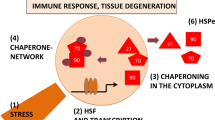Abstract:
Mitogen-activated protein kinases (MAPKs) and heat shock proteins (Hsps) are ubiquitous proteins that function in both normal and stress-related pathophysiological states of the cell. Recent advances in the study of such Hsps and their interaction with signaling kinase cascades, including the cloning of new members, has helped to define their physiological roles in various tissues. In the pancreas, three major MAPKs, ERKs, JNKs, and p38, have been demonstrated. While intracellular signals involved in the ERK cascade have been most extensively investigated, only a few upstream regulators and downstream effector proteins of the JNKs and p38 MAPK are known in the pancreas. Similarly, a number of Hsps have been identified in pancreas, including Hsp27, Hsp60, and Hsp70. Although the activation of various MAPKs and the induction of Hsp expression have clearly been demonstrated following experimental exposure of rodent pancreas to stress conditions, it remains to be determined whether Hsps have a protective or detrimental effect during acute pancreatitis or at the onset of pancreatic carcinoma. This review will summarize current knowledge of the regulation and function of stress-activated kinases and stress proteins in the pancreas.
Similar content being viewed by others
Author information
Authors and Affiliations
Additional information
Received: September 6, 1999 / Accepted: September 24, 1999
Rights and permissions
About this article
Cite this article
Schäfer, C., Williams, J. Stress kinases and heat shock proteins in the pancreas: possible roles in normal function and disease. J Gastroenterol 35, 1–9 (2000). https://doi.org/10.1080/003655200750024443
Issue Date:
DOI: https://doi.org/10.1080/003655200750024443




